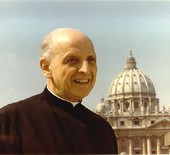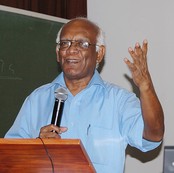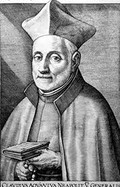Terms: A | B | C | D | E | F | G | H | I | J | K | L | M | N | O | P | Q | R | S | T | U | V | W | X | Y | Z
Jesuit Terms A
Addresses and Keynotes
The Jesuit Intellectual Apostolate: Discernment, Collaboration, Networking
Arturo Sosa, S.J., Superior General of the Society of Jesus, March 23, 2017
Challenges of Jesuit Higher Education Today
Adolfo Nicolas, S.J., Superior General of the Society of Jesus
The Service of Faith and the Promotion of Justice in American J Higher Ed
Peter-Hans Kolvenbach, S.J., Superior General of the Society of Jesus
Keynote Address at Santa Clara University's Justice Conference, October 6, 2000
Explore Inaugural Addresses and Important Keynotes.
Acosta, José de (1540-1600)
Spanish Jesuit; missioner to Latin America; cultural anthropologist
José de Acosta went to the University of Salamanca and entered the Jesuits at an early age. At 17, he was writing poetry and plays and teaching grammar and humanities. As a student at the University of Alcalá, then the intellectual hub of Spain, he came into contact with some of the most brilliant minds in Europe. He was nominated to succeed the famous Cardinal Francisco de Toledo in the chair of theology at the Gregorian University in Rome, the intellectual headquarters of the Jesuits.
Instead, he volunteered to work in the New World and was sent to colonial Peru, a far more difficult front for his intellectual and pastoral activities. This new world of native peoples and (supposedly Christian) conquistadores challenged him with a host of intellectual and moral problems, shaking his ideas at their very foundations and forcing him to new understandings.
Gradually, Acosta undertook the most systematic, enlightened and compassionate study of Latin America made during colonial times. After 14 years in Peru and several more in Mexico, he returned to Europe and published two great volumes, one on the culture and customs of the American natives and the other on how to present the gospel to them. With the perspective of four centuries, we can say that José de Acosta deserves to be called a founder of the discipline of cultural anthropology and one of the most important interpreters of the new world to the old.
In his later life back in Spain, he was drawn into contact and action with the small but powerful group of dissident Spanish Jesuits that sought to remove superior general Claudio Acquaviva from office.
(Taken from Traub, Xavier magazine [Winter 1991]. There is a biography of Acosta: Claudio Burgaleta, José de Acosta [1540-1600]: His Life and Thought [Loyola, 1999].)
Alumni
 The 27 Jesuit colleges and universities in the United States have educated over one million living graduates to be people of competence and compassion. See some of the famous, influential, and noteworthy alumni from Xavier University and elsewhere.
The 27 Jesuit colleges and universities in the United States have educated over one million living graduates to be people of competence and compassion. See some of the famous, influential, and noteworthy alumni from Xavier University and elsewhere.
IMAGE LEFT: Julie Isphording, seen here, graduated from Xavier University in 1983 and went on to become a member of the first-ever women's U.S. Olympic Marathon team.
Alumnus/Alumni and Alumna/Alumnae
The words referring to graduates of a school are often misspelled because the user is unfamiliar with the Latin from which they come.
Alumnus refers to one male graduate.
Alumni refers to more than one male graduate, although it is often used to refer to more than one graduate of both genders.
Alumna refers to one female graduate.
Alumnae refers to more than one female graduate.
In less formal discourse, the English neologism alum can be used for one graduate of either gender and alums for more than one graduate of either or both genders.
A.M.D.G.
Ad Majorem Dei Gloriam (Latin)
"For the greater glory of God." Motto of the Society of Jesus.
Amaladoss, Michael (1936- )
Indian Jesuit; theologian
Michael Amaladoss grew up in an Indian Christian family in South India and joined the Jesuits in 1953. In addition to the regular course of Jesuit formation and education, he studied South Indian classical music, art, and culture. He wrote a doctoral dissertation at the Institut Catholique in Paris on the variable and invariable elements in sacramental rites.
After returning to India, he founded an interreligious dialogue group with the creative British Benedictine Bede Griffiths, and he taught on the Jesuit theological faculty in Delhi with his former teacher, Jacques Dupuis. Next, he spent twelve years as a counselor to Superior General Peter-Hans Kolvenbach with special responsibility for Jesuit missions. He dislikes being called a missiologist, however, and wants to be known as "an Indian theologian who is also interested in mission and dialogue, inculturation and liberation" ( My Pilgrimage in Mission, International Bulletin of Mission Research, 31 [2007]).
See Mary Ann Hinsdale, I.H.M., "Jesuit Theological Discourse since Vatican II," Cambridge Companion to the Jesuits (2008).
Anchieta, José de (1534-1597)
Spanish Jesuit; missioner to Brazil; father of Brazilian literature, and one of the founders of two great cities, Sao Paulo and Rio de Janeiro; Saint
A native of the Canary Islands (Spanish territory), though his father was born and raised in the Basque land of northern Spain, he studied at the Jesuit College of Coimbra in Portugal and from there entered the Jesuits at age 17. Right after he completed his two-year novitiate and in spite of a painful spinal condition, he asked to be sent to the missions in Brazil.
There he mastered the native Tupi language and wrote its first grammar as well as volumes on theology, theater, and poetry and on the country's wildlife and geography.
His extensive, difficult, and dangerous travels around the vast country led to his founding various missions, including those that became Sao Paulo and Rio de Janiero. He recognized and exposed the injustices Portuguese conquerors inflicted on the people, but he also risked his life to negotiate peace with a hostile tribe and its leader whom he won over.
Anchieta's lucid and detailed reports back to his superiors in Rome are still considered important today for understanding the lives, knowledge, and customs of the indigenous people and the colonizing Europeans during this time.
He was declared a saint by Pope Francis in April 2014.
Mary-Cabrini Durkin, Ours: Jesuit Portraits (2006)
Back to top
Apostle
Apostle/apostolate/apostolic
Apostle is the role given to the inner circle of twelve whom Jesus "sent out" (on mission) and to a few others like Saint Paul. Hence apostolate means a "mission endeavor or activity" and apostolic means "mission-like."
Aquaviva, Claudio (1543-1615)
Italian Jesuit; Fifth Superior General
Elected superior general at the age of 37, when he had been a Jesuit for only fourteen years. Served in this office for 34 years, by far the longest term of any superior general. At one point a group of dissident Jesuits in Spain lobbied to remove him from office; some also favored secession of Spanish Jesuits from the order. Neither goal was realized.
During his generalate, the Society grew from 5,000 to 13,000. He codified Jesuit educational practice with the definitive edition of the Ratio Studiorum [ The Plan of Studies] (1599) and did the same for the collected practices and guidelines for giving the Spiritual Exercises with the Official Directory of 1599.
He was concerned about questions of missiology and the adaptation of the gospel to non-European cultures (e.g., India, Japan, China). Within the order, he promoted the yearly making of some week-long version of the Spiritual Exercises (earlier it was assumed that making the full Exercises once was good for life).
Archbishop
The leader of an archdiocese and of the surrounding larger territory with its own bishops and dioceses.
Archdiocese
Within the Roman Catholic Church, a district of importance due to size or historical significance.
Back to top
Arrupe, Pedro (1907-1991)
Basque Jesuit; 28th Superior General of the Jesuits (1965-81)
 Pedro Arrupe was the central figure in the renewal of the Society after Vatican Council II, paying attention both to the spirit of Ignatius the founder and to the signs of our times. From the Basque country of northern Spain, he left medical school to join the Jesuits, was expelled from Spain in 1932 with all the other Jesuits, studied theology in the Netherlands, and received further training in spirituality and psychology in the U.S. Arrupe spent 27 years in Japan until his election in 1964 as Superior General. During his time in Japan, he was suspected of being a spy and was put in solitary confinement for 33 days early in World War II. Near the end of the war, he cared for victims of the atomic bomb in Hiroshima. He is considered the founder of the modern, post-Vatican II Society of Jesus.
Pedro Arrupe was the central figure in the renewal of the Society after Vatican Council II, paying attention both to the spirit of Ignatius the founder and to the signs of our times. From the Basque country of northern Spain, he left medical school to join the Jesuits, was expelled from Spain in 1932 with all the other Jesuits, studied theology in the Netherlands, and received further training in spirituality and psychology in the U.S. Arrupe spent 27 years in Japan until his election in 1964 as Superior General. During his time in Japan, he was suspected of being a spy and was put in solitary confinement for 33 days early in World War II. Near the end of the war, he cared for victims of the atomic bomb in Hiroshima. He is considered the founder of the modern, post-Vatican II Society of Jesus.
See "Men and Women for Others"
See Pedro Arrupe: One Jesuit's Spiritual Journey: Autobiographical Conversations with Jean-Claude Dietsch
Pedro Arrupe's Mysticism of Open Eyes Kevin Burke, SJ, Jesuit School of Theology
See Pedro Arrupe: His Life and Legacy (Frank Frost Productions. DVD. Distributed by the Institute for Advanced Studies at Boston College)
Back to top
Assembly '89: Jesuit Ministry in Higher Education (1989)
200th Anniversary of U.S. Jesuit and Catholic Higher Education
The idea of gathering all the Jesuits engaged in higher education in the U.S. came from a group of Jesuit provincials in the early 1980s. Georgetown College had been founded in 1789 by Bishop John Carroll, a Jesuit until the papal suppression of the Society of Jesus in 1773. So in early June 1989, 750 Jesuits and more than 150 lay peoples gathered at Georgetown University, celebrating its 200th anniversary, to assess the Jesuit higher education apostolate. The keynote address was given by British geologist Frank H. T. Rhodes, then president of Cornell University and friend of Timothy Healy, SJ, Georgetown's president. Rhodes showed a very real grasp of the issues facing Jesuit higher education and offered some constructive and creative suggestions for where it could be headed. "Can Jesuits," he asked, "achieve something of a new renaissance here, providing models of 'committed integrity' as they grapple with scholarship and contemporary society." As a literate and committed Christian, he also asked "How do the implications of the incarnation influence your teaching?" In the other major address Jesuit superior general Peter-Hans Kolvenbach dealt with issues that are as relevant today as they were in 1989: the need to operate in an interdisciplinary way and seek the integration of knowledge, collaborating with those in the social apostolate and learning from them, forming a global horizon and identity, teaching students to make no significant decision "without first thinking of how it would impact the least in society." (Links to both addresses are given below.)
Behind the scenes at Assembly '89, a small group of Jesuits who had participated in the "Conference on Collaboration" at Creighton the previous year and who had a specific charge from their respective presidents to carry on "mission work," began to envision what would become the AJCU Conference on Mission and Identity ( see "Mission and Identity Conference of AJCU: A Brief History").
Frank H. T. Rhodes, "The Mission and Ministry of Jesuits in Higher Education"
Peter-Hans Kolvenbach, Address at Assembly '89: Jesuit Ministry in Higher Education
Associations
Jesuit Higher Education
Association of Jesuit Colleges and Universities (AJCU)
The AJCU, with offices in Washington, DC, serves the 27 U.S. Jesuit colleges and universities. For most of its history, it has been engaged in two major activities: (1) lobbying the federal government (the AJCU Federal Relations Network) and (2) helping more than 35 "affinity groups" or "conferences" (e.g., chief academic officers, student affairs officers, chief financial officers, advancement officers, human resource officers ) network across its schools for mutual support, sharing of information and best practices, and offering opportunities to discuss issues in each one's area of higher education. The conferences meet at least once a year. The head of AJCU has always been a former president of a Jesuit school.
Since 1997, with the advent of Charles Currie as president, two additional emphases have emerged: (1) significant support for the AJCU Mission and Identity Conference (founded in the early 1990s) and (2) the establishment of international outreach programs that link educational needs--especially in third-world countries--with resources in U.S. Jesuit higher education.
The 27 U.S. Jesuit schools of higher ed exist among a much larger group of 221 Catholic colleges and universities; internationally there are 189 Jesuit institutions of higher education.
Connect with the AJCU website.
Catholic and Christian Higher Ed
- Association of Catholic Colleges and Universities
- Lilly Fellows Program in Humanities and the Arts at Valparaiso University
- The National Association of Independent Colleges and Universities
Jesuit and Catholic Secondary and Middle School/Primary Education
- Cristo Rey Network
- Jesuit Schools Network (formerly known as: Jesuit Secondary Education Association)
- National Catholic Education Association (Elementary - University)
Atonement
See "Salvation in Christ".
Back to top
Authors of articles in this "Jesuit A to Z" collection
- GS = Grace Skalski, CSJ
- JAB = Joseph A. Bracken, SJ
- JAMR = Jo Ann M. Recker, SNDdeN
- JH= Jennifer Head, BVM
- JM = Judith Metz, SC
- MA = Marjorie Allen, RSM
- M-CD = Mary-Cabrini Durkin
- PK = Phil Kilroy, rscj
- RB and JM = Regina Bechtle, SC, and Judith Metz, SC
- SA = Susan Arcaro, rc
- SC = Sarah Cantor, SNJM
- SM = Sarah MacDonald
- DM = Debra Mooney PhD
Most of the articles without author initials in this "Jesuit A to Z" section were written (with help from many sources) by George W. Traub, SJ.




